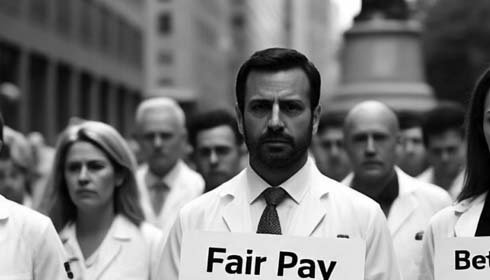
Need for Changes in Work Rules as Doctors' Strikes Rising: Study
In a new study published in the New England Journal of Medicine researchers from the Harvard Pilgrim Health Care Institute, talks about an important problem: more doctors are going on strike in the United States. Experts from Harvard Law School worked together on this study. It highlights the important need for changes in rules to help reduce the negative impacts of strikes on healthcare systems and to protect the rights of doctors.
The analysis is at an important point. In the last two years, there have been many doctor strikes around the world, with three big ones happening in the U.S. just in the past year. Many medical residents, fellows, and attending doctors are starting to join together to form unions. They are worried about too much work, not enough pay, and rising money problems.
“Doctor strikes are happening more and more, and we can't ignore this anymore,” said Tarun Ramesh, the main author and research fellow at the Harvard Pilgrim Health Care Institute. His words show the growing problems around the world among healthcare workers, with important strikes happening in South Korea, France, and the United Kingdom. In these countries, healthcare workers have shared their concerns about inadequate working conditions, low pay, and not enough help from the government during tough times.
In India, doctor strikes are happening more often, showing problems in the country's healthcare system. In 2023, many doctors and medical workers in India went on strike. They wanted better pay and working conditions, showing that this is a common feeling around the world.
The Perspective gives clear solutions that U.S. policymakers can use, learning from the best practices of other countries. For example, France and Italy have put in place rules that require a minimum number of staff during strikes to keep patients safe. This plan could really help India, where the healthcare system is often too stressed, and this can cause important services to be missed during times of labour issues.
Another suggested step is to make it easier for many U.S. doctors to join together in unions. Right now, U.S. labour laws do not allow independent contractors and certain types of healthcare workers to form unions. Updating these laws, as the researchers suggest, could help improve negotiations while keeping care quality high. In India, where private healthcare is common, a similar change could strengthen the bargaining rights for doctors working in private hospitals.
The authors also ask for protections to stop punishment for doctors who go on strike. They say that following the rules from the International Labour Organisation (ILO) can help protect the relationship between workers and employers as well as keep the public's trust. Indian healthcare systems can improve by using similar rules to ensure a fair and clear way to handle labour disputes.
One important suggestion is to involve all the right people—hospitals, healthcare systems, state medical boards, and groups like the American Medical Association—to create and carry out fair policies. “Our findings show that we need to change the rules to protect both doctors' rights and keep patients safe,” said Hao Yu, senior author and associate professor at Harvard Medical School.
Both the central and state governments in India manage healthcare, so involving everyone is crucial. Working together on policies could help stop long strikes that interrupt services in government hospitals, which are often the only option for many patients.
Healthcare systems around the world are facing more pressure, and doctor strikes show bigger problems underneath. In the U.S., India, and Europe, more and more workers are taking action. This shows that there is a common need for changes that help healthcare workers while still keeping patients safe.
The Harvard study gives helpful ideas for dealing with these problems. Policymakers in the U.S. and India can create lasting solutions by looking at examples from other countries and talking with important people involved. Making sure that workers have fair conditions while keeping patient care going is not just a goal—it is something we must do.